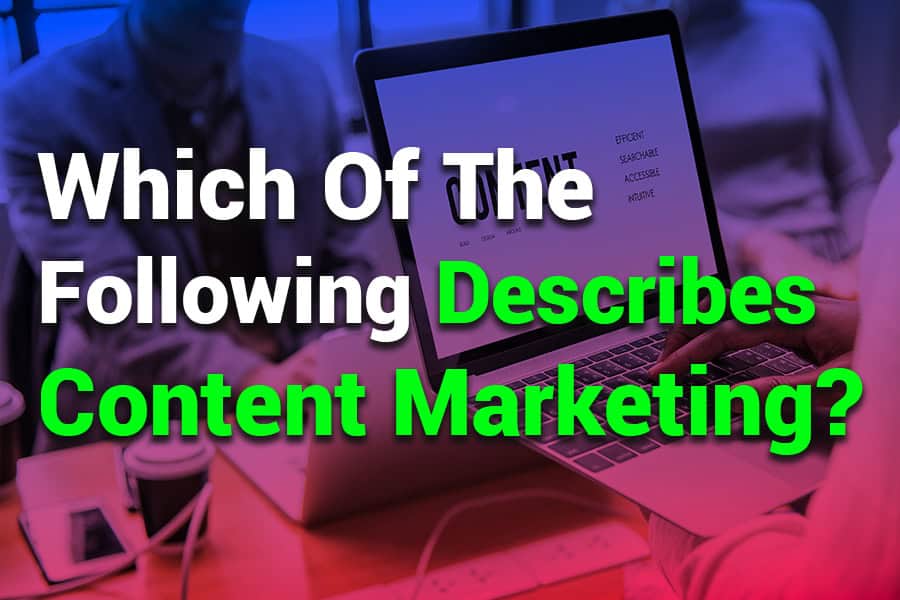
Content marketing is an essential strategy in digital marketing, but what truly describes it? If you’re exploring ways to define content marketing, this article breaks down its key attributes, benefits, and objectives. Essentially, content marketing involves creating valuable, relevant content that resonates with an audience to attract and retain customers. Unlike traditional advertising, which pushes products directly, content marketing subtly builds trust by delivering information or entertainment that meets specific audience needs.
In this article, we’ll explore various descriptions of content marketing and analyze which best fits its purpose and role in a marketing strategy. Whether you’re new to content marketing or a seasoned professional, understanding what truly defines it will help refine your approach and improve your connection with your audience.
Which of the following describes content marketing?
Content marketing is best described as a strategic approach to creating and distributing valuable, relevant, and consistent content to attract and retain a defined audience. This form of marketing focuses on engaging customers without directly selling to them. Instead, it builds trust and encourages brand loyalty by addressing audience needs, answering their questions, or entertaining them through various content formats like blog posts, videos, and social media.
What is Content Marketing? Understanding the Definition
Content marketing is a customer-focused approach that goes beyond traditional advertising. It involves creating materials like blog posts, videos, podcasts, social media updates, and eBooks that provide genuine value to the audience.
- Content Marketing as a Strategic Approach: Content marketing is not just about producing content—it’s a strategic process where every piece of content serves a specific purpose. The goal is to build customer relationships by providing useful information that solves problems, answers questions, or offers inspiration.
- How Content Marketing Differs from Traditional Advertising: Traditional advertising aims for direct sales through promotional messaging. Content marketing, in contrast, is more subtle, focusing on fostering trust and brand loyalty by providing value without directly selling.
- Content Marketing Formats: Content marketing spans a range of formats, including blogs, videos, infographics, podcasts, and social media posts. Each format offers unique ways to engage different segments of an audience.
- Why Brands Invest in Content Marketing: Brands prioritize content marketing because it builds long-term relationships with their audience. By consistently delivering value, brands position themselves as industry leaders and earn customer trust.
- Content Marketing and Customer Trust: Trust is central to content marketing. By consistently providing helpful, relevant content, brands become trusted resources, which boosts loyalty and encourages repeat engagement.
Why is Content Marketing Important in Today’s Digital Landscape?
Meeting Evolving Customer Expectations
Today’s customers are more informed than ever and value brands that offer genuine insights over hard-sell tactics. Content marketing aligns with these preferences by focusing on value over promotion.
Increasing Brand Visibility and Authority
Quality content that answers common questions or provides unique insights helps boost brand authority. Search engines reward helpful, relevant content, improving visibility in search results.
Driving Traffic and Generating Leads
Engaging, informative content attracts organic traffic to websites, building a steady stream of potential leads. Once visitors find value in the content, they’re more likely to explore other offerings.
Supporting the Buyer’s Journey
Content marketing addresses the needs of customers at each stage of the buyer’s journey, from awareness to decision-making. Each piece of content guides them closer to making a purchase.
Content Marketing as a Cost-Effective Strategy
Compared to paid advertising, content marketing offers a cost-effective approach to reaching and engaging audiences over time. Quality content continues to generate value long after it’s published.
Which of the Following Describes Content Marketing? Key Characteristics
Below are key characteristics that accurately describe content marketing:
- Value-Driven: Content marketing prioritizes delivering information, insights, or entertainment that benefits the audience.
- Consistent and Relevant: Consistency is vital for retaining audience interest and ensuring content remains relevant to their needs.
- Customer-Centric: Content marketing focuses on addressing customer pain points and interests rather than promoting the product directly.
- Supports Brand Goals: Each piece of content is designed to align with broader brand goals, such as increasing brand awareness or building loyalty.
- Long-Term Engagement: Unlike short-term advertising, content marketing builds long-term relationships with customers, encouraging repeat engagement.
These characteristics set content marketing apart as a unique approach that fosters connection rather than pushing for immediate sales.
Common Content Marketing Formats and How They Work
Various content types fall under content marketing, each serving unique purposes to engage audiences.
Blog Posts: Blogs are informative articles that address common questions, share tips, and provide insights. They serve as a valuable resource, driving traffic and encouraging readers to explore more about the brand.
Videos: Videos are a powerful way to capture attention and explain complex topics in an engaging format. They’re particularly effective on social media, where users engage with visual content more readily.
Infographics: Infographics present data or information visually, making complex information easy to understand. They are highly shareable and can boost brand visibility across platforms.
Social Media Posts: Social media content engages audiences where they spend a lot of their time. Posts can be informative, entertaining, or interactive, encouraging followers to connect with the brand.
Podcasts and Webinars: Podcasts and webinars allow brands to share in-depth knowledge and insights. They help build authority and are especially useful for audiences seeking deeper engagement.
Each format serves a specific purpose, allowing brands to reach audiences in different ways and on various platforms.
How does Content Marketing align with SEO?
Keyword Optimization
Content marketing benefits SEO when content is optimized with relevant keywords. This helps search engines connect the content with search queries, improving its visibility.
Backlink Opportunities
High-quality content is often linked to other websites, which helps build a brand’s backlink profile and boosts SEO rankings.
Improving Dwell Time
Engaging content increases the time users spend on a site, signaling to search engines that the content is valuable. This metric can help improve search rankings.
Enhancing Content with Internal Linking
Internal links help search engines understand site structure and guide visitors through the content. Linking related content within articles can also improve user experience.
User-Focused Content that Ranks
SEO prioritizes user-focused content that meets search intent. By creating content that answers questions and provides insights, brands can achieve better search visibility and rank higher.
Measuring the Success of Content Marketing
Tracking Engagement Metrics: Monitor metrics such as likes, shares, and comments on social media to understand how audiences engage with content.
Analyzing Website Traffic: Website traffic helps gauge the effectiveness of content in driving visitors to the brand’s website. Google Analytics provides insights into which content drives the most traffic.
Conversion Rates: Conversion rates indicate how effectively content guides visitors toward desired actions, whether it’s signing up for a newsletter or making a purchase.
Lead Generation and Nurturing: Content that generates leads or encourages repeat engagement shows its effectiveness in building customer relationships.
SEO Performance: Track SEO metrics like keyword rankings and organic traffic to assess how well content performs in search results over time.
By tracking these metrics, brands can assess the impact of their content and make data-driven adjustments to their strategy.
Final Word
Content marketing is best described as a strategic approach to creating valuable, relevant content designed to engage audiences and build lasting relationships. Through a mix of different content types, brands can educate, entertain, and inspire their audience, ultimately leading to higher brand loyalty and increased conversions. Unlike traditional advertising, which focuses on direct sales, content marketing subtly nurtures connections by meeting audience needs and preferences. By understanding the essence of content marketing and tracking its effectiveness, businesses can refine their strategy and stay competitive in the digital space.
FAQ’s
Q. How is content marketing different from traditional marketing?
A. Content marketing emphasizes value and engagement rather than direct sales, building relationships over time.
Q. What are examples of content marketing?
Examples include blog posts, social media updates, videos, infographics, and webinars.
Q. How does content marketing support SEO?
A. Content marketing boosts SEO by using keywords, encouraging backlinks, improving user engagement, and enhancing site structure through internal linking.
Q. What metrics should I track for content marketing success?
A. Key metrics include engagement, website traffic, conversion rates, lead generation, and SEO performance.
Jessica Jones
Jessica Jones is a talented writer at J Morgan Marketing, where she excels in creating compelling and engaging content tailored to meet the unique needs of clients. With a keen understanding of digital marketing strategies, Jessica crafts narratives that not only captivate audiences but also drive brand growth. Her expertise spans across various content forms, from blog posts and articles to social media and SEO-driven copy, ensuring that every piece resonates with its intended audience and contributes to the overall marketing goals. Passionate about storytelling and innovation, Jessica is dedicated to helping brands connect with their audience through powerful and effective content.






